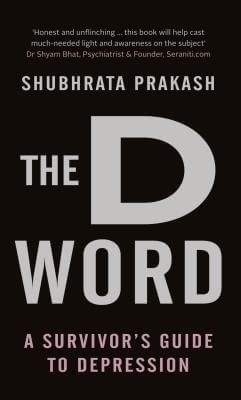I’m A Survivor Of Depression & This Is My Story
Intelligent. Achiever. Smart. Creative. Inspiring.
These were some words I had been hearing about me since I was old enough to understand conversations. Happy. Cheerful. Bubbly. “She doesn’t walk, she skips!” were added to this list as I grew up. And thus, my self-image was fashioned out of these very words.
“This little one has the brains to set fire even to water!” was what an old relative had said when I was 5. Little did I know that that very brain would lose itself in the foggy mists of depression, and my whole life itself would be set on a kind of dull, grey fire, thus adding the ‘D’ word to the list above.
I am Shubhrata Prakash, an officer with the Indian Revenue Service (IRS), married to a dashing police officer and a mother of two great boys. I am also a daughter who feels very proud to be capable of supporting her octogenarian parents when required. And my loving family is the one solid reason that I am alive today, having managed to beat the ‘Black Dog’ of depression again and again, over a period of more than a decade.
Why Civil Services?
While growing up, I dreamt of being many things. I excelled at school and college, followed by an MBA. My creative pursuits took me to the world of marketing and advertising. However, my heart was really not into it, as I realized later.
In my home state of Bihar, when I was growing up, any child who was any good at studies, was assumed to be destined for only one career path – the civil services. Having lived in that world, I had many plans for what I would do to improve governance when I made it to the civil services. So, after a few months, I quit my corporate job, went home and started preparing for one of the toughest exams in the country.
In 2002, with an all-India rank of 66, I made it to the IRS. I was already married by then. I finished my training, got posted as Assistant Commissioner of Income Tax and another phase of life began for my husband and me when we became parents.
An Unwanted Visitor Of The Mind
Somewhere, in the midst of all this happiness, something had started to go wrong with my mind. What had started as postpartum depression, slowly but steadily grew into full-blown and severe Major Depressive Disorder (MDD). Alas, my family and I, were a part of a totally misinformed society that believes that Major Depression, or depression as it is commonly referred to, is the same as sadness – sadness that the sufferer is not able to overcome out of choice; rather than a disorder of the brain that affects one’s thought and takes over one’s complete behavior.
There is a lot of social stigma attached to depression, arising from a misperception that depression is a choice that ‘weak’ people make. The stigma is so deep that often the sufferers themselves are not ready to accept the diagnosis out of fear of being labelled ‘mental’ and more often than not, even doctors are hesitant to suggest to someone that they may be having MDD.
So, some five years after having first started to display the symptoms, I was formally diagnosed with MDD in 2011. After the initial shock, and the same ‘weak-strong-how-can-I-have-depression?’ pattern of thought, my husband and I prudently accepted this diagnosis and moved on to treatment options.
The Treatment & The Downhill
Initially, the treatment involved antidepressant medication and psychotherapy. For the next 18 months, the treatment worked and I got well enough to taper off antidepressant medication. However, what I thought was the end was somehow only the middle, and the worst was yet to come.
In August 2012, a particularly virulent episode of MDD started, which lasted for more than 4 years and often left me thinking whether existing like that had any meaning.
During these 4 years, I was on antidepressant medication for the most part. The drug protocol kept escalating as progress out of the brain fog was sometimes there, sometimes not. I also kept receiving psychotherapy in the form of Cognitive Behavioral Therapy (CBT). When nothing seemed to be working, I even turned to complementary and alternative therapies.
There came a point in time when the adverse effects of medication became so debilitating that I was fast forced to taper off all anti-depressant medication.
Small Windows Of Hope!
After a somewhat tough battle with the withdrawal effects of medication and the remnants of severe MDD, things began to lighten up. Recovery came as very tiny windows of normal mood, which kept growing bigger and bigger and now, almost two years since I stopped taking antidepressants, I still feel good – like I used to when MDD had not held my mind and brain hostage.
During the most severe phase of MDD, I used to keep reading books and surfing the net all the time, trying to understand what was happening to me and how I could help myself climb out of the Rabbit Hole into which I had fallen.
I came across a lot of material on neurosciences detailing what changes happen to the brain in MDD, how depression was not a choice but a disorder of the brain, and how many survivors had managed to tame the beast.
I had been writing since I was a child and at this stage of my illness, my family and my psychotherapist kept encouraging me to take up writing seriously, more as a form of therapy than anything else. Having been at the receiving end of a lot of social stigma arising from ignorance about mental illnesses, caustic questions and useless advice, I thought it was time for me to write a book about what MDD is and how I had been managing to survive it.
And thus, ‘The D-Word: A Survivor’s Guide To Depression’ was written and published.

The book was a really therapeutic experience for me - both the actual writing and the recognition it received post-publication, though it was not easy to open up and lay bare my life, to talk about an illness few even accept suffering from. A lot of people keep writing in for advice or to share their own stories of living with the ‘D’.
I have also been able to share my story on different platforms - websites, book events and at places like UNICEF and WHO.
It gives me great satisfaction when someone says that my book helped them or their loved one. Every time someone says to me “Thank you for writing this book/Thank you for sharing your story” - it makes laying my life out for public scrutiny so many times worth the while.
Even here and now, as I talk about my fight with MDD, my purpose is to put the spotlight on mental health and mental illnesses.
I want the whole world to know that mental illness is neither a choice nor is it something to be ashamed of. Mental illnesses are distinctly related to changes in the brain, though the exact causes and cause-effect relationships are not definitively known. I have great hope that with advancement in technology, neuroscience research will become better and more effective and one day, we will not only know what exactly causes mental illnesses and behavioural disorders like MDD, but we will also have a sure shot cure for it.
As for what worked for me, well, let me reiterate that as of date, there is no known cure for MDD – there is no silver bullet to slay the beast. This is so because a definitive cause of MDD is still not known. Treatment in the form of medication, psychotherapy and complementary therapies exists. In my case, medication benefits plateaued, then plunged into the negative region (This may not be true for everyone; please do not go off your medication or alter it in any form without your psychiatrist’s advice). However, CBT was a life saver. Physical activity, in the form of yoga, swimming and off late, running, has really helped. So has mindfulness meditation.
If you, or a loved one, are struggling with depression, please do not lose hope – there is life beyond depression and recovery is possible. You have to keep trying out different things to see what works for you.
The key is to learn to survive – just taking each day as it comes - till depression lifts.
Whenever I was riddled with existential questions and life seemed very bleak, I anchored my life to the smiles of my loving husband and kids, and this helped me survive some of my darkest days. Find your own anchor and even though it may seem difficult in the present, you will find one eventually.
So, now, after the ‘D’ word being added to the list about me, ‘Author’ got added too. ‘Determined’ and ‘Hopeful’ are some others. But you know what gives me the most kick? ‘Survivor’! That is the word which defines this phase of my life and I feel really proud in saying that as of now, I have gone from surviving to thriving.

Shubhrata Prakash
Shubhrata Prakash is an officer with the Indian Revenue Service and a proud Depression Survivor. She is the author of the best-selling book ‘The D-Word: A Survivor’s Guide to Depression’ (published by Pan Macmillan, 2016).
Let’s break all the stigma around mental health. Join our Maala Support Group to get the conversation started.












